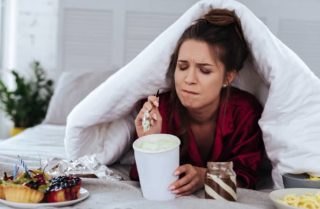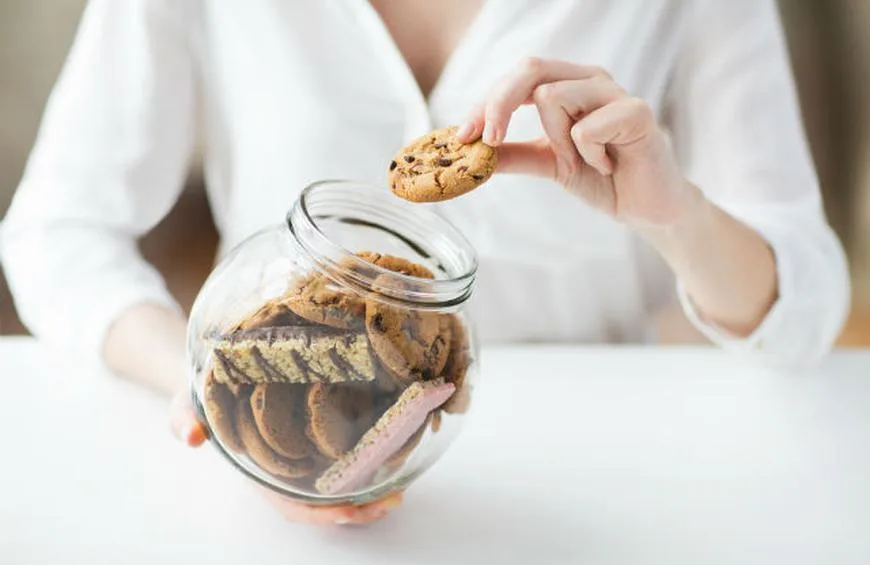While sheltering is the best way to protect ourselves against the coronavirus, being stuck at home isn’t necessarily the best thing for our health. This is because it can lead to some unhealthy habits, and coupled with our high stress and anxiety levels, it’s no surprise that a lot of us may find ourselves stress eating.
Unfortunately, the strongest food cravings can hit us when we’re not at our best emotionally. Think about it, how many times have you turned to a slab of chocolate when things are simply not going your way? In fact, a survey by the American Psychological Association (APA) found that around 40% of adults admitted to overeating or consuming junk food when they were stressed out during the prior month. Furthermore, about half of those people went on to admit that they stress-ate on a weekly basis.
Why do we stress eat?
When we’re stressed, the body releases the hormone cortisol in order to help the body protect itself. Unfortunately, prolonged high cortisol levels can increase food cravings, particularly for sugary or fatty foods.
Additionally, similar to drugs, alcohol, and sex, food has been found to be an addiction and a coping mechanism Thankfully, there are many treatment options for addiction. In fact, research published in the Neuroscience and Biobehavioral Reviews journal found that eating can invoke some of the same neurological reactions that drugs do, activating the pleasure centers of the brain. 
As a result, the brain becomes trained in believing that unhealthy foods are what we need to get through stressful times. It then begins to force us to actively seek unhealthy foods when we’re stressed.
How does stress eating affect our health?
The fact of the matter is, stress eating doesn’t solve anything. It’s merely a distraction and once you’re done, you’ll find that your stress levels have increased rather than lowered.
What’s more, the foods we choose to stress eat aren’t exactly the healthiest. This can then increase the risk of obesity, heart disease, and diabetes. Additionally, people who stress eat may have a binge eating disorder, which is an extreme version of stress eating and this also carries serious health risks.
Yes, stress may be a part of life, but that doesn’t mean that you should let it get the best of you. We’re all concerned about COVID-19. However, that doesn’t mean that we should allow stress and anxiety to jeopardize our health. With that said, there are a few ways you can make it through the quarantine without stress-eating your way through a box of chocolate cookies.
10 hacks to avoid stress eating in quarantine
1. Acknowledge that you’re stressed
You can’t stop stress eating if you don’t admit that you’re stress-eating. If you find yourself eating more sugary and fatty foods in one sitting than usual, it’s important for you to take a minute and check-in with yourself.
 Are you eating because you’ve suddenly had a craving? Or are you trying to distract yourself from an unpleasant reality? The fact is, you can’t stop stress eating until you address the emotional reasons behind it. If you are anxious about the current state of affairs, that’s nothing to be ashamed of. The world has suddenly tilted, and our current new normal is going to take some getting used to. That said, there are a few coping strategies that you can use if you begin to feel overwhelmed with coronavirus stress.
Are you eating because you’ve suddenly had a craving? Or are you trying to distract yourself from an unpleasant reality? The fact is, you can’t stop stress eating until you address the emotional reasons behind it. If you are anxious about the current state of affairs, that’s nothing to be ashamed of. The world has suddenly tilted, and our current new normal is going to take some getting used to. That said, there are a few coping strategies that you can use if you begin to feel overwhelmed with coronavirus stress.
2. Avoid temptations
A study published in the Nutrition Journal found that when we’re able to see sugary and fatty foods, this can affect a part of the brain that controls our impulses, resulting in increased cravings and overeating.
So, if you really want to monitor your stress eating, then it would be advisable to remove all forms of temptation. Try not to keep any junk food in the house as your brain is definitely going to make you seek it out. If you really want to keep a few packets of chips, or a box of cookies in the house, then keep them out of sight, such as in a pantry or cupboard.
3. Try mindful eating
Mindful eating refers to being more present while you eat. Doing so can help fight stress eating, and it can even help you lose weight.
To practice mindful eating, do a quick self-check before you reach for a snack. Ask yourself if you’re feeling bored, anxious, or hungry. Learning how to keep in touch with your emotions can help you better understand your appetite and cravings. If you ask yourself why you’re eating, you may be surprised at the answer.
Another way to practice mindful eating is to minimize distractions as you enjoy your meal. This means staying away from smartphones, television and other technology when eating a meal or snack. The fewer distractions you have, the more you can focus on your meal, which can help to prevent overeating and make you more aware of your eating patterns, and the reasons behind them.
4. Keep healthier options around
If you can’t resist the urge to eat between meals, then it’s important to have healthier options on standby.
This can include fresh fruit, vegetables, nuts, kale chips, or a small piece of dark chocolate.
5. Start a food diary
Keeping a food diary, where you log in to what you eat and when you eat it may help you identify stress triggers that lead to emotional eating. For instance, you may find yourself stress eating after scrolling through social media, or after speaking to your employer because you’re worried about your job security. 
By identifying these triggers, you’ll be able to address the behavior that leads to your stress eating. Be it spending less time on social media, or practicing breathing exercises after work-related phone calls.
6. Watch your portions
When snacking, it’s common practice to grab the entire bag of chips or the whole ice cream tub from the freezer to snack on. Try to avoid this and rather measure out your portions.
Once you’ve measured out your portions and placed them on a small plate, enjoy your snack and give yourself time before going back for seconds.
7. Stick to a glass a day
Yes, you have nowhere to go, and you’re more stressed than usual, but that doesn’t mean that you should finish a bottle of wine in one sitting.
If you’re stress eating, chances are you’re also going to be stress-drinking. As such, you should be more aware of your drinking habits. Try pouring yourself a glass of sparkling water between drinks or adding a few slices of fresh fruit to your water to boost its flavor.
8. Practice mindfulness
Mindfulness is the act of being present and aware. It can help us be calmer and focused, which can then lead us to make healthier choices.
![tender [longevity live]](https://longevitylive.com/wp-content/uploads/2018/09/yoga-3053487_640-320x230.jpg) If you’re stressed out, adopting mindfulness-based exercises like mediation, yoga, and even tai chi is a great way to slow things down and help you refocus.
If you’re stressed out, adopting mindfulness-based exercises like mediation, yoga, and even tai chi is a great way to slow things down and help you refocus.
If you’re not sure where to start, YouTube has plenty of free guided mindfulness tutorials.
9. Reach out
Just because you can’t physically visit your confidante, doesn’t mean that you can’t pick up the phone and reach out. This is especially true if your stress levels are through the roof.
Talking out your feelings with close friends and family can help provide you with the support that you need. If you find that your emotions are getting the best of you, step away from the kitchen and pick up the phone.
10. Exercise
Yes, your favorite gyms and fitness studios are closed. However, that doesn’t mean that you can’t get in a good workout.
While being stuck indoors may have reduced our activity levels, studies have found that staying physically active can help to not only improve your mood, but it can also reduce stress, both of which can help to prevent stress eating (1).
Thankfully, there are plenty of free streaming workouts available online, and thanks to current times, they allow you to be active in a number of ways right in your living room.
Conclusion
With the current COVID-19 pandemic, you may find yourself trying to process your emotions by rummaging through the kitchen cabinet. However, this can cause you more harm than good in the long run. Thankfully, the aforementioned tips may help you prevent stress eating and even improve other aspects of your health.
References
Avena, N. M., Rada, P., & Hoebel, B. G. (2008). Evidence for sugar addiction: behavioral and neurochemical effects of intermittent, excessive sugar intake. Neuroscience and biobehavioral reviews, 32(1), 20–39. https://doi.org/10.1016/j.neubiorev.2007.04.019
He, Q., Xiao, L., Xue, G., Wong, S., Ames, S. L., Schembre, S. M., & Bechara, A. (2014). Poor ability to resist tempting calorie-rich food is linked to the altered balance between neural systems involved in urge and self-control. Nutrition Journal, 13, 92. https://doi.org/10.1186/1475-2891-13-92
Koo, K. M., & Kim, C. J. (2018). The effect of the type of physical activity on the perceived stress level in people with activity limitations. Journal of exercise rehabilitation, 14(3), 361–366. https://doi.org/10.12965/jer.1836164.082





![women [longevity live]](https://longevitylive.com/wp-content/uploads/2020/01/photo-of-women-walking-down-the-street-1116984-100x100.jpg)










One Comment